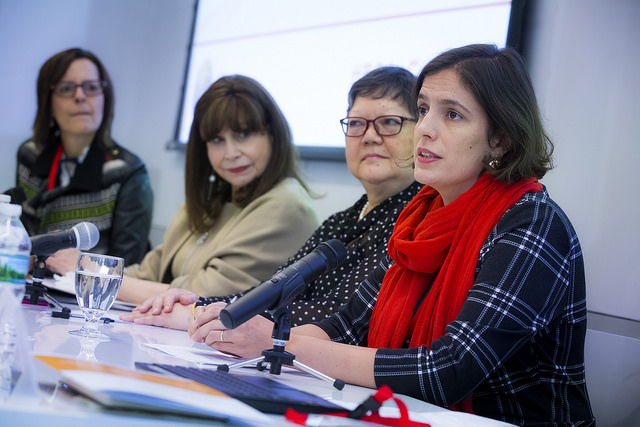Bringing Standards to Brazil: Teachers College holds the first public discussion of the new learning standards in the world’s fifth-largest nation
One of the highlights of Teachers College’s ninth annual Academic Festival was the first public discussion of Brazil’s National Common Curricular Base – a set of learning standards for primary and middle schoolers unveiled just a few days prior. Chaired by TC alumna Leticia Guimaraes Lyle (M.A. '11), founder of several nonprofits in Brazil and developer of a social and emotional learning curriculum that is being taken up by the nation’s schools, the panel focused on lessons Brazil might learn from the U.S. Common Core experience as it begins implementation of its new standards.
“Standards aren’t a silver bullet, but they provide a backbone to show what a ‘right to education’ really means.” —Alice Andres Ribeiro
As in the United States, Brazil’s standards are a response to a persistent problem, said Alice Andres Ribeiro, Executive Secretary of Moviemento Pela Base National Comum, the group that led the advocacy effort in support of the standards’ development. In Brazil, only one in 10 current eighth graders was reading on grade level by the third grade, and just one in 10 students leaves high school having learned fundamentals in mathematics.
“Standards aren’t a silver bullet, but they provide a backbone to show what a ‘right to education’ really means,” Ribeiro said.
The current document, which already reflects input from Brazil’s 90,000 teachers, is a great starting point said economist Vera Cabral, who is currently a Lemann Foundation Visiting Scholar at TC – but implementation poses the challenges of three major shifts: from content- to competency-based education; from a model centered on teaching to one focused on learning; and from a status quo of having “no clear definition of what students should learn” to standards that provide highly prescriptive definitions at each grade. To navigate such changes, Brazil – home to more than 5,000 municipalities, 95 percent of which have populations of fewer than 50,000 people – will need to avoid taking a top-down approach, Cabral said. Rather, the nation will need to harness the internet, social media and other tools in order to support teachers, parents, students and local officials “to enable them to be owners of this reform.”
“In the absence of curriculum, all you have is assessments, and you end up teaching to that.” —Susan Fuhrman
TC President Susan Fuhrman, an eminent policy expert who has written extensively on the U.S. standards movement, pointed to several lessons from the American Common Core experience. Sequencing changes dictated by the new standards is of paramount importance, Fuhrman said, because “no one does everything at once.” She added that Brazil would be well-served by focusing first on translating its standards into curriculum rather than jumping straight to assessment of students.

Fuhrman also cautioned that “the extra challenge in education is that most of what you want people to do involves them learning how to do it – and they can’t turn on a dime.” For example, in the United States, teachers have faced a steep learning curve due to a Common Core directive to teach more non-fiction texts. Schools and teachers “always need more technical assistance than we imagine,” Fuhrman said – yet state and district agencies here have responded to budget constraints by “stripping out all the people who know about teaching and learning,” leaving primarily lawyers and accountants.
“We don’t think of teachers as working except when they’re in front of students, but so much of what they do at other times has a huge impact.” —A. Lin Goodwin
TC Vice Dean A. Lin Goodwin echoed Fuhrman’s comments, arguing that “it takes time to make a world of difference.” With only so much time in a school day and school year, Goodwin argued, teachers need designated times set aside for learning new approaches and material.
“We don’t think of teachers as working except when they’re in front of students,” Goodwin said, “but so much of what they do at other times has a huge impact.” Teachers tend to stay in their jobs longer than policymakers and government officials, she added, and if they’re not partnered with and accommodated, there is a real danger that will simply “ride it out” and “only look like they’re complying” with the new reforms.
Goodwin concluded with a call for a massive campaign to educate the Brazilian public about the need for the new Common Core. Responding to a question from the audience, she also urged Brazil’s leaders to focus on the broad goal of “education” as well as on the specifics of “schooling.”
“The goal of education,” she said, “is to prepare young people for a world that hasn’t happened yet.”
— Joe Levine
Related Stories
Honoring Alumni Who Educate for Social Justice
Part of the Festival: A Celebration of TC Student Work
Published Wednesday, Apr 12, 2017